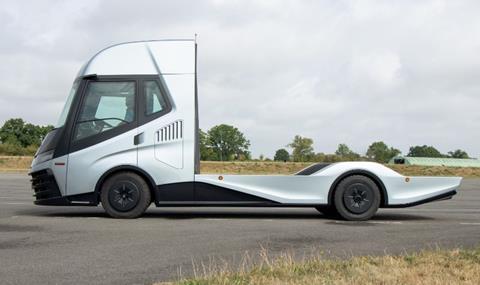
As few as seven hydrogen refuelling stations are required to cover the majority of UK HGV movements, according to the Glasgow-based commercial vehicle developer HVS.
Speaking ahead of the unveiling of a technology demonstrator (pictured) to showcase its fully functional hydrogen-electric powertrain next week, HVS head of sustainability and CSR, Daniel Musenga-Grant, said the clean fuel was well-suited to HGVs due to the quick refuelling times and minimal operational upheaval compared to current practices.
HVS has designed and developed a fully working zero-emission model, which is a precursor to a full-sized hydrogen-electric HGV expected to be launched early in 2023.
The company said it will be the first to market with its powertrain and it intends on building its vehicles in the UK, with the first 40-tonne hydrogen-powered HGV set to go on sale in 2025.
Musenga-Grant acknowledged that a current lack of hydrogen refuelling infrastructure was a challenge, but it was not onerous to overcome: “Due to commercial vehicles often following set routes or operating on back-to-base refuelling models you need far fewer hydrogen refuelling stations for HGVs than you would for private vehicles, meaning you can implement a strategic role out of the hydrogen refuelling network,” he said.
“We estimate that you need as little as seven stations to cover the majority of UK HGV movements.”
Read more
- Seize hydrogen opportunities or lose out, industry rally to warn government
- ScottishPower hydrogen plant at Felixstowe Port could power 1,300 trucks a day from 2026
- Green hydrogen key to net-zero challenge but transport sector faces toughest ever times, FORS delegates warned
HVS said it was working closely with its investor Euro Garages Group, which was already investing in hydrogen production for its network of refuelling forecourts: “There are a number of Innovate UK projects running at the moment that are attempting to overcome this barrier as well,” Mussenga-Grant said.
“I would say that though the vehicles are slightly ahead, the industry is aware of the problem and is working to address the disconnect.”
He added that it was “vital” that the hydrogen fuel was derived from renewable sources and that the green hydrogen economy was still emerging: “The vast renewable energy generation capabilities we have in the UK, and especially in Scotland where HVS was founded, can and are being utilised to produce green hydrogen for transport use.”
Addressing how the government can encourage the uptake of hydrogen-fuelled HGVs, Mussenga-Grant said more competitions such as the zero-emission road freight trials, with a focus on synchronised rollout of the required refuelling infrastructure and hydrogen CVs would provide significant support.
He said: “The building of more renewable energy capacity, and low-cost hydrogen produced from the excess generation, would drive down the total cost of ownership of HVS’ vehicles further and increase uptake of vehicles, in turn increasing demand for fuel.
“The creation of a strategic hydrogen refuelling network laid over the existing UK motorway network would encourage the uptake of hydrogen vehicles in the UK and increase hydrogen fuel demand, pulling the hydrogen refuelling industry forward.
“In short, the government needs to facilitate the synchronised vehicle and refuelling infrastructure rollout, to keep both industries at the same stage of commercialisation,” he added.













